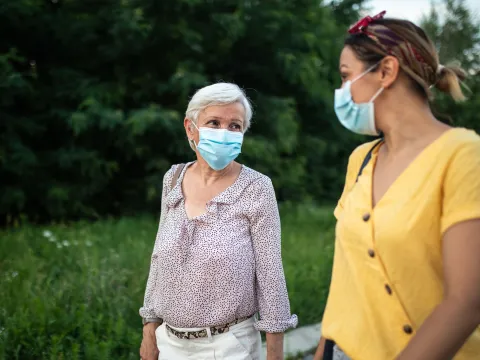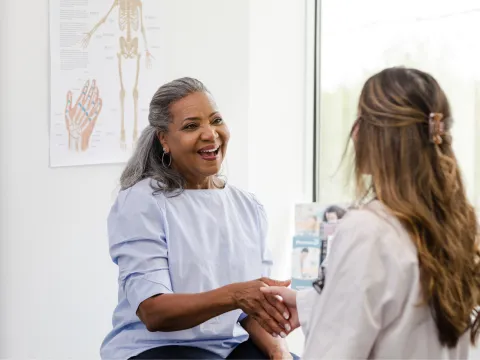- AdventHealth

The highly contagious delta variant is responsible for a majority of the current COVID-19 cases and is leading to record numbers of hospitalizations for mostly unvaccinated individuals. Even so, the “to vaccinate or not to vaccinate” debate is still a topic of many discussions.
We’re here to help you make informed decisions — and answer difficult questions. Here are a few concerns those close to you may be expressing about the COVID-19 vaccine and suggestions on how you can respond.
- If they say: “I don’t know if the vaccine is safe.”
-
You can say: I understand, but extensive clinical trials were conducted with many thousands of study participants to evaluate the COVID-19 vaccine. The trials generate scientific data and other information for the Food and Drug Administration (FDA) to determine its safety and effectiveness. Also, millions of people have already had the vaccine without complications.
The CDC goes in-depth on vaccine safety here. AdventHealth’s COVID-19 Vaccine Scientific Review Committee, as an independent committee, also reviewed the process which evaluated the efficacy and safety of the vaccine.
- If they say: “The vaccine was created too quickly.”
-
You can say: It was able to be developed quickly for two main reasons. First, it’s a worldwide medical emergency, allowing companies to apply for emergency use authorization (EUA) through the FDA.
The EUA process was designed to help communities when circumstances call for immediate action, such as during a pandemic. The vaccine manufacturers were simultaneously creating vaccines during their trials so they would immediately be ready to distribute, once granted EUA.
The expedited process involved multiple steps of approval that usually happen sequentially to happen simultaneously instead.
Second, the mRNA technology used by Moderna and Pfizer allowed those vaccines to be developed faster because this isn’t a new technology. But it is the first time a synthetic mRNA vaccine has been widely distributed.
- If they say: “I don’t know what’s in the vaccine.”
-
You can say: The ingredients vary for each of the vaccines from different manufacturers. Moderna and Pfizer’s vaccines each contain something called mRNA, or messenger ribonucleic acid. These vaccines work by using synthetic mRNA to direct the body to produce a small amount of spike protein.
Once the vaccinated person’s immune system detects this protein, their body begins producing protective antibodies to defend against coronavirus. The protective antibodies will recognize and help prevent COVID-19 from getting into the body’s cells in the future, should that person be exposed to coronavirus.
You can read more on the differences in the Pfizer, Moderna and Johnson & Johnson vaccines here.
- If they say: “I’m not sure how the vaccine works.”
-
You can say: I know that the vaccine helps you develop antibodies that make you less susceptible to the disease. It does not use the live virus that causes COVID-19. It’s like giving your immune system a blueprint for how to fight the virus before you come in contact with it.
Some COVID-19 vaccines need two doses to be effective. Second dose scheduling information is provided following your first dose, and the second dose should take place no sooner than 21 days (or 28 days, depending on the manufacturer) following the first dose. - If they say: “I’m worried about the side effects.”
-
You can say: In nearly all cases, any side effects from the vaccine are much milder than the symptoms of COVID-19. Like with other vaccines, it’s normal to possibly experience some fatigue, aches or fever after getting a shot. This does not mean the vaccine has given you COVID-19 — it just means your body’s immune system is working to protect itself.
- If they say: “The vaccine could give me COVID-19.”
-
You can say: None of the vaccine candidates currently available are considered “live vaccines,” meaning they have no live virus in them and cannot give a person the disease.
- If they say: “The vaccine could cause issues with pregnancy and/or infertility.”
-
You can say: There is currently no evidence that any vaccines, including COVID-19 vaccines, cause fertility problems in women or men.
Evidence about the safety and effectiveness of COVID-19 vaccination during pregnancy has been growing and suggests the benefits of receiving a COVID-19 vaccine outweigh any known or potential risks of vaccination during pregnancy.
Read what our OB/GYNs have to say about getting the vaccine while pregnant here.
More Information on Coronavirus Vaccines
Remember, the delta variant is even more transmittable, and the best way to protect ourselves is by getting vaccinated. For more information on COVID-19 and coronavirus vaccines, visit our Coronavirus Vaccine Resource Hub.



